Student Nurse Resume Examples

Jul 18, 2024
|
12 min read
Your guide to creating an outstanding student nurse resume: Tips and tricks to get 'scrubbed' into your dream job, one application at a time.
Rated by 348 people
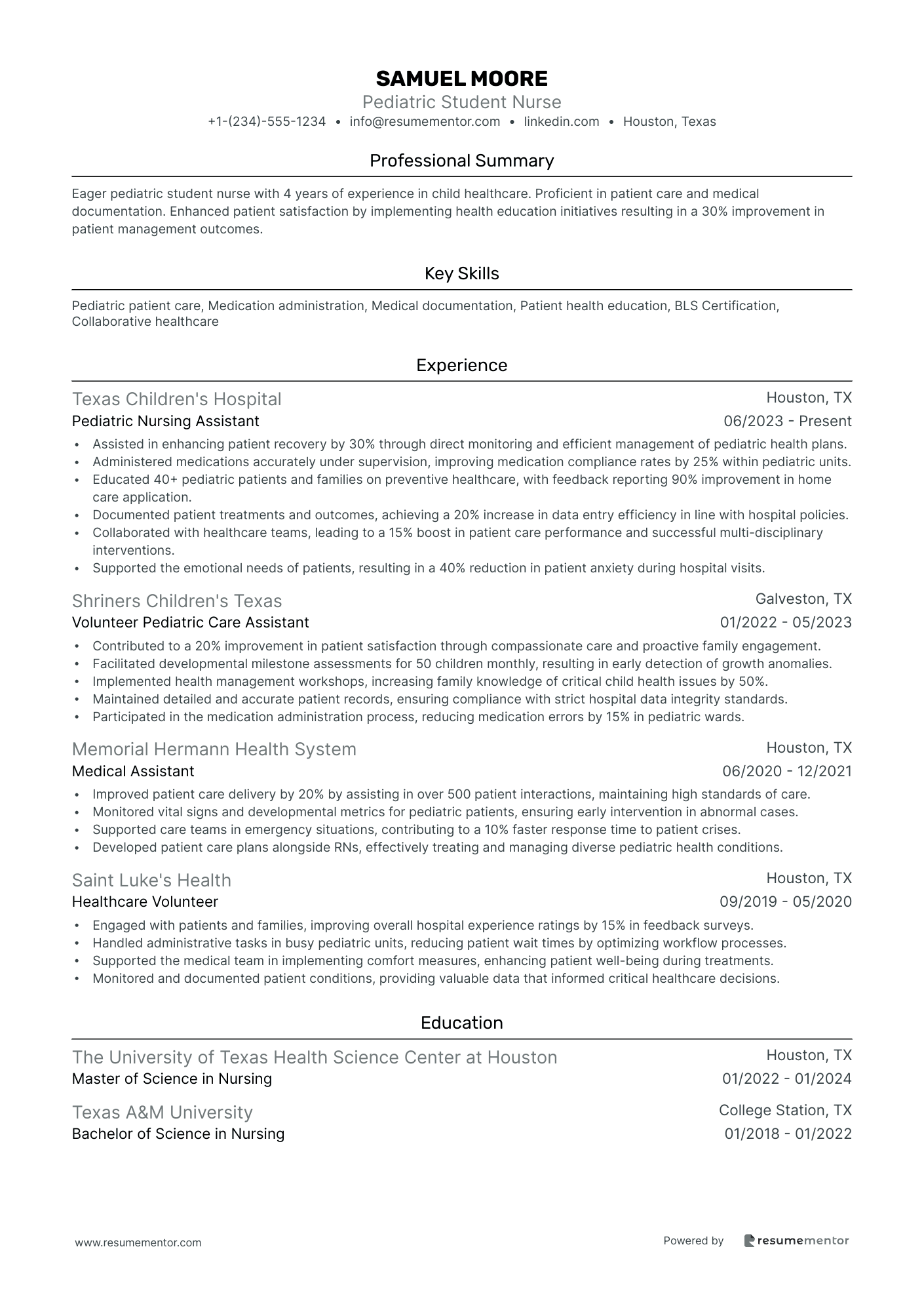
Pediatric Student Nurse
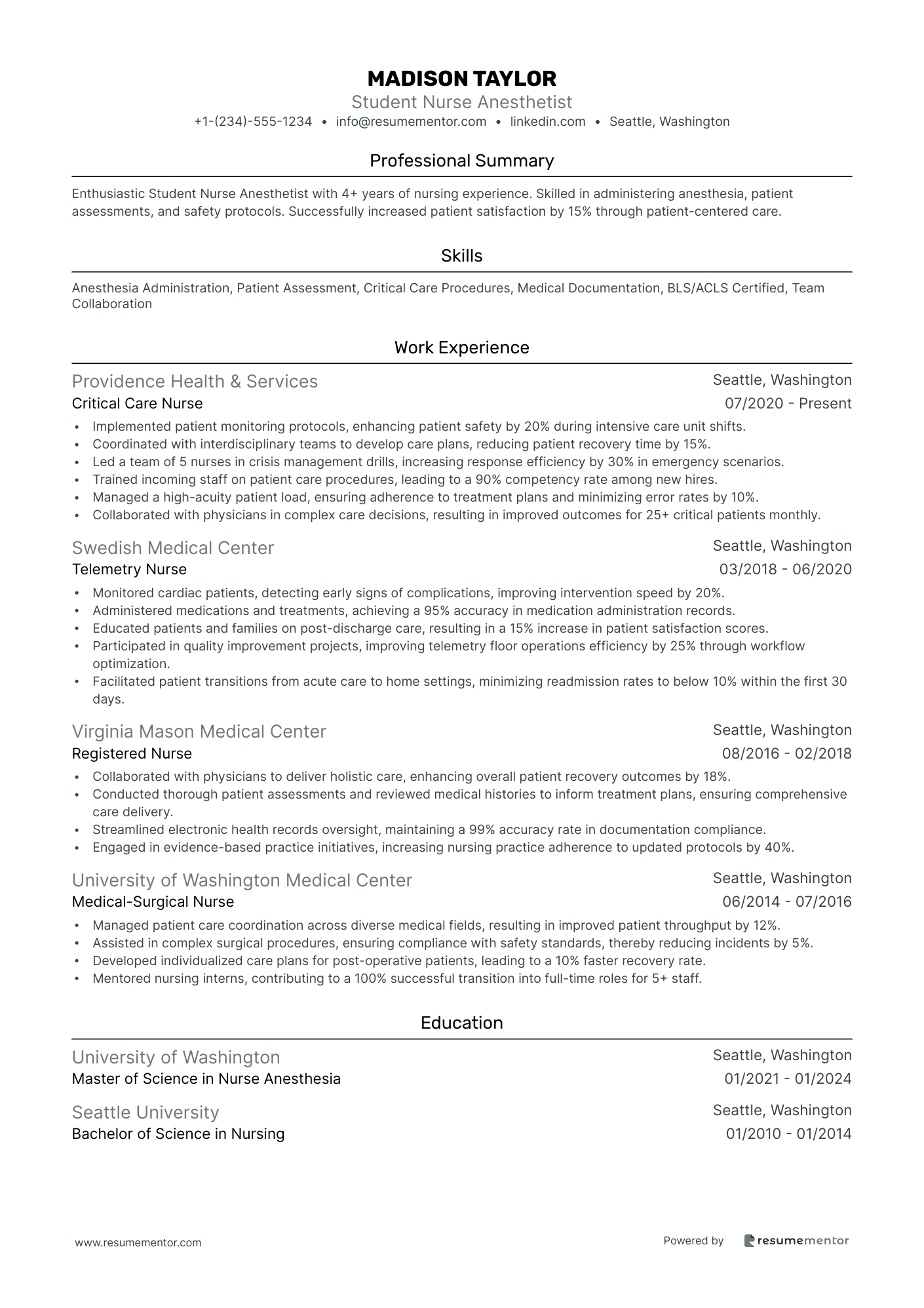
Student Nurse Anesthetist
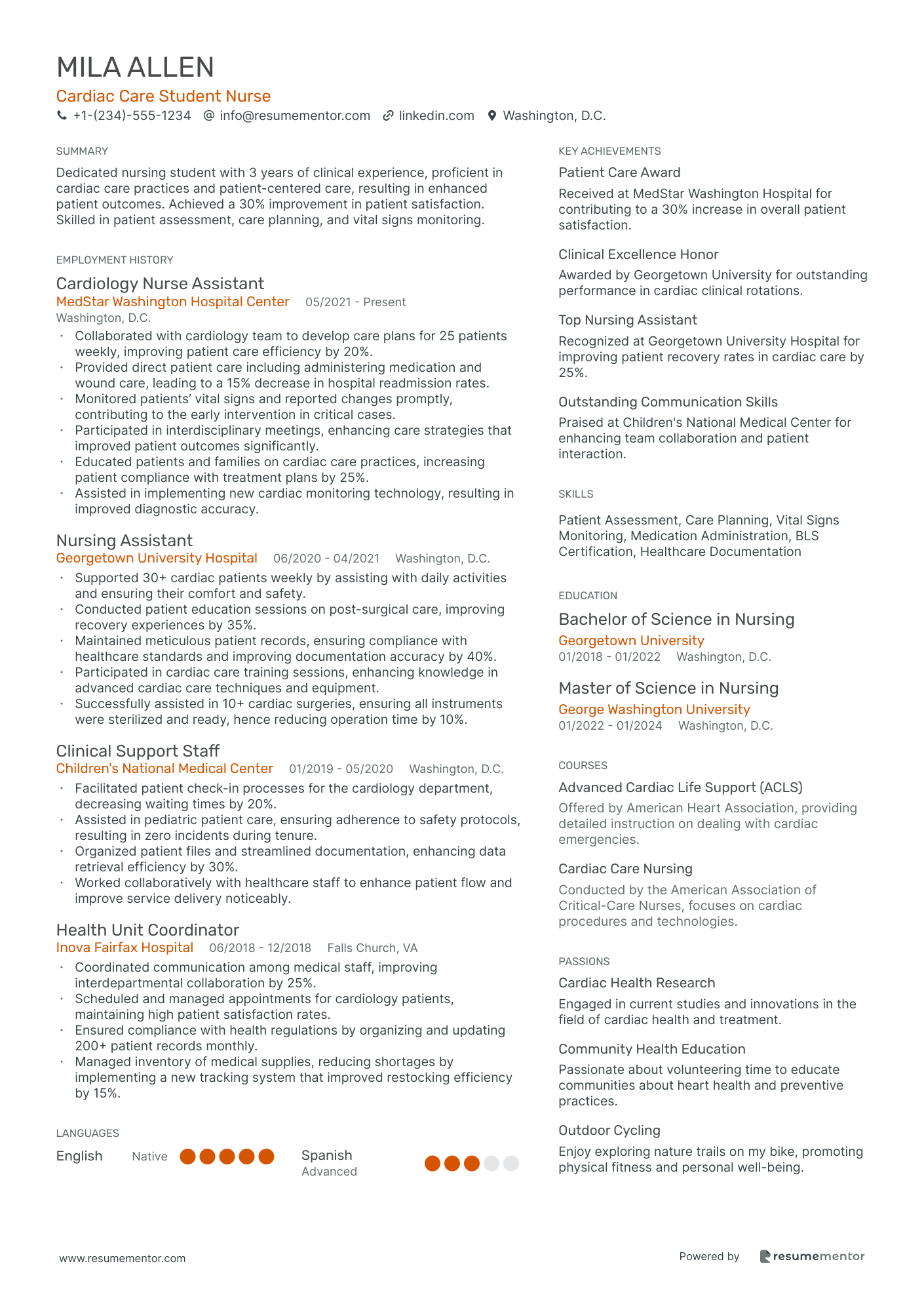
Cardiac Care Student Nurse
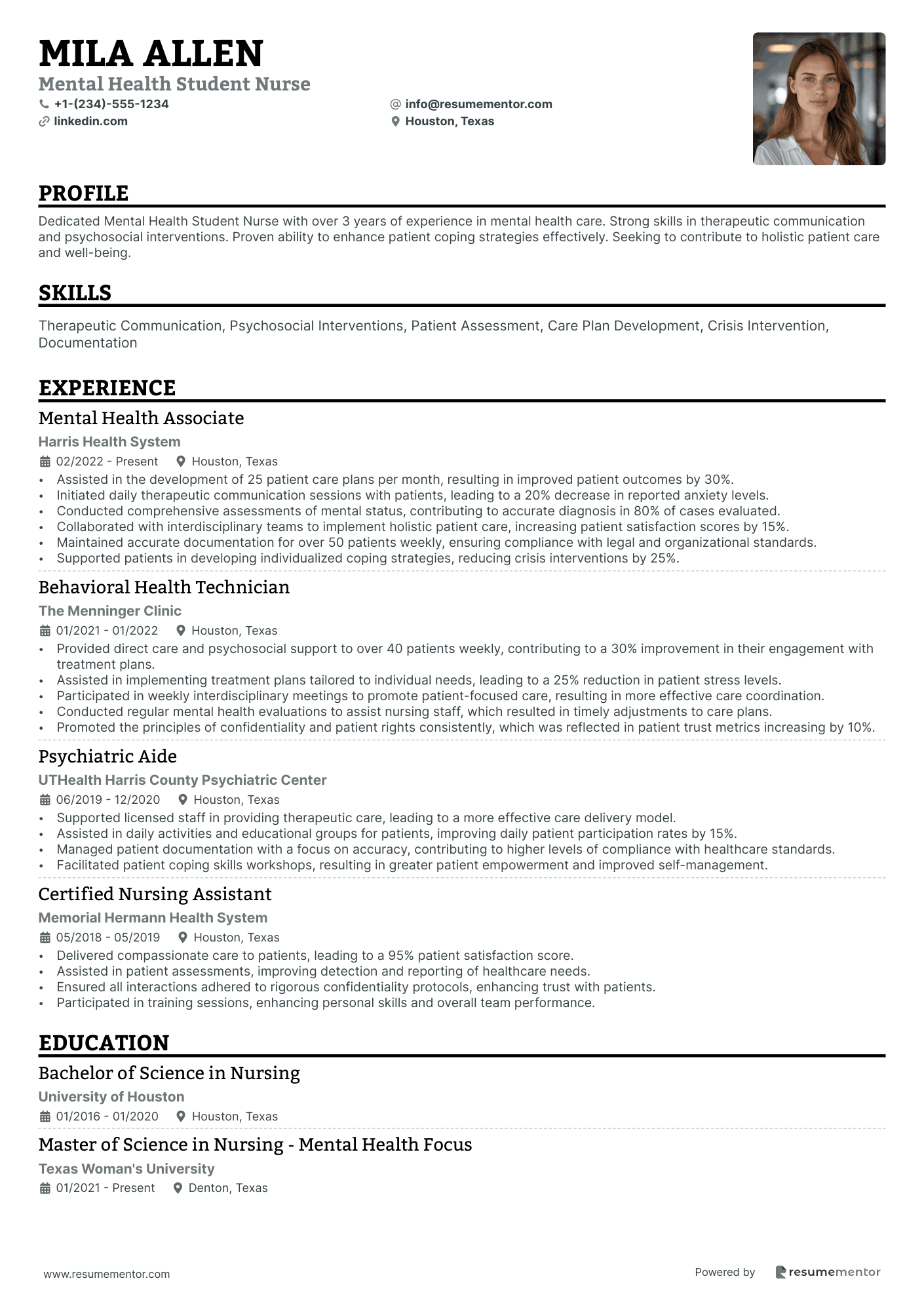
Mental Health Student Nurse
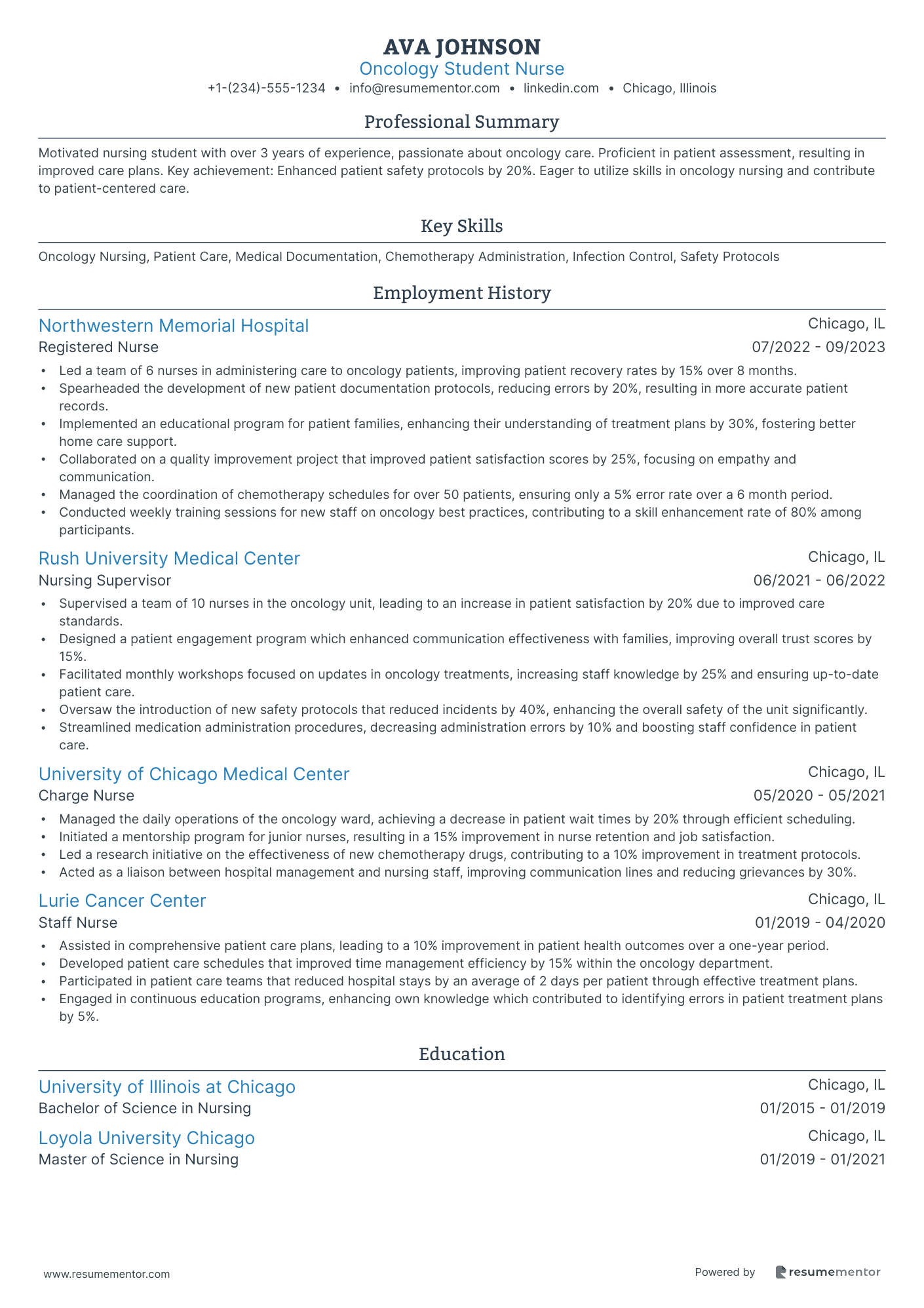
Oncology Student Nurse
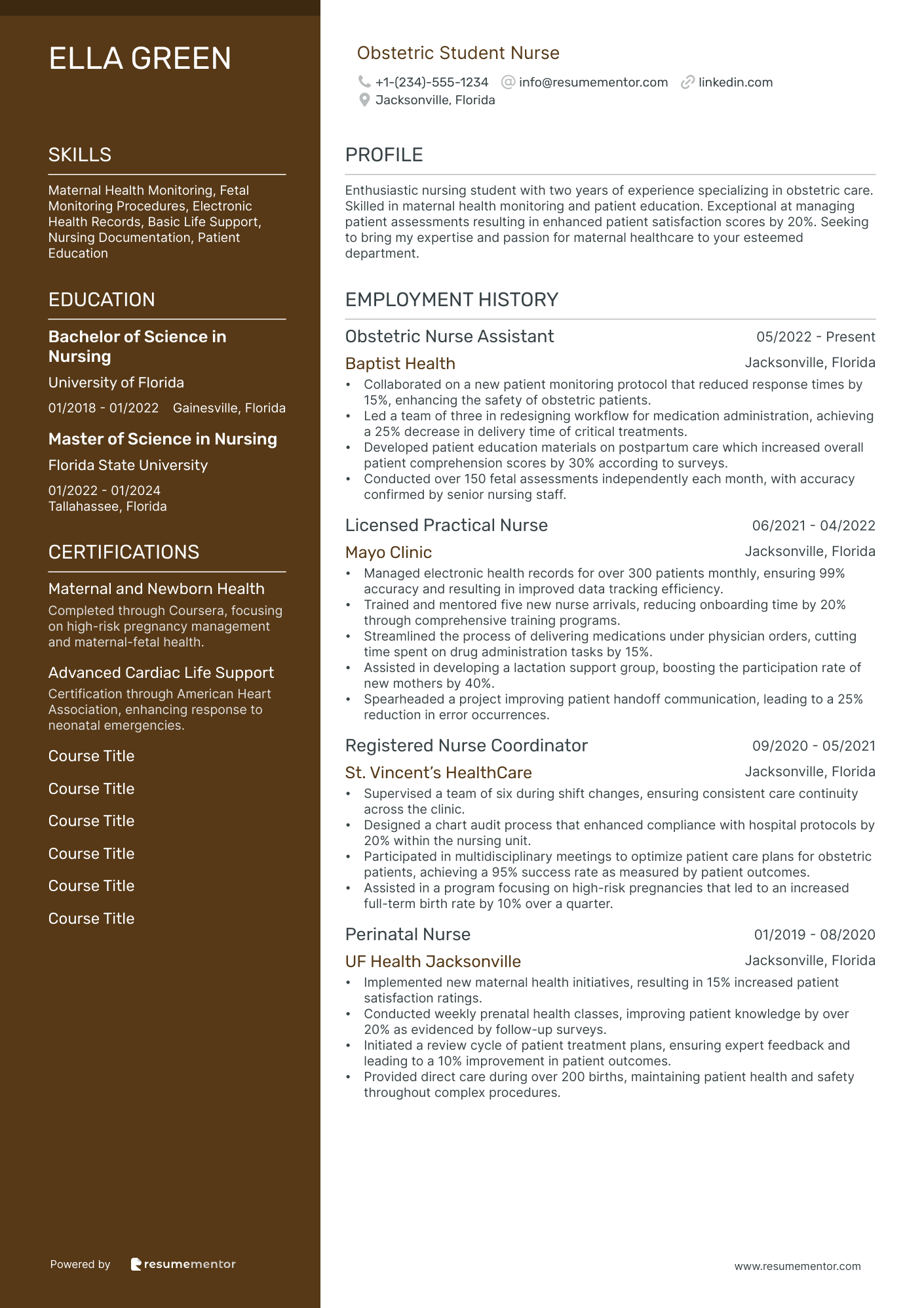
Obstetric Student Nurse
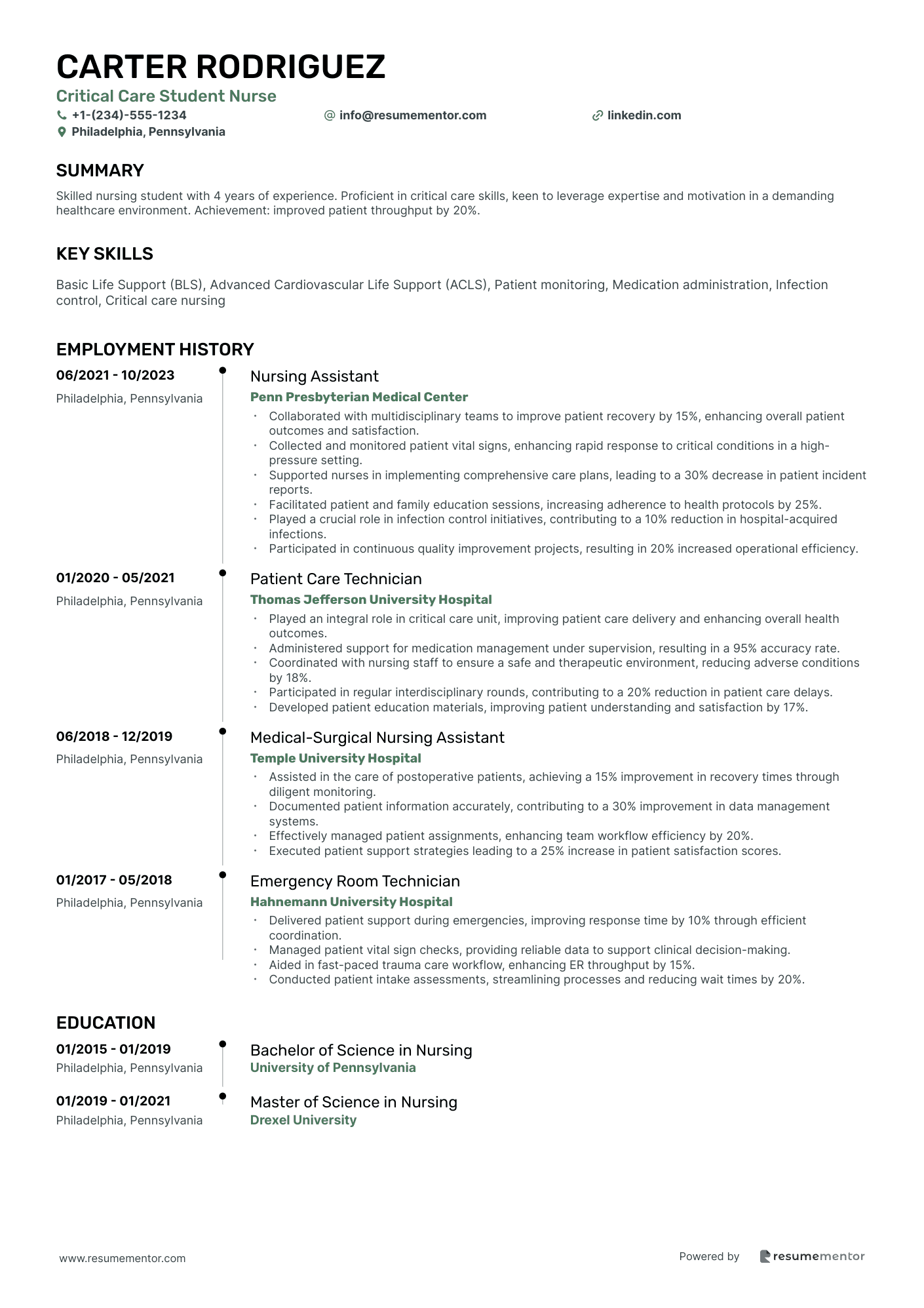
Critical Care Student Nurse
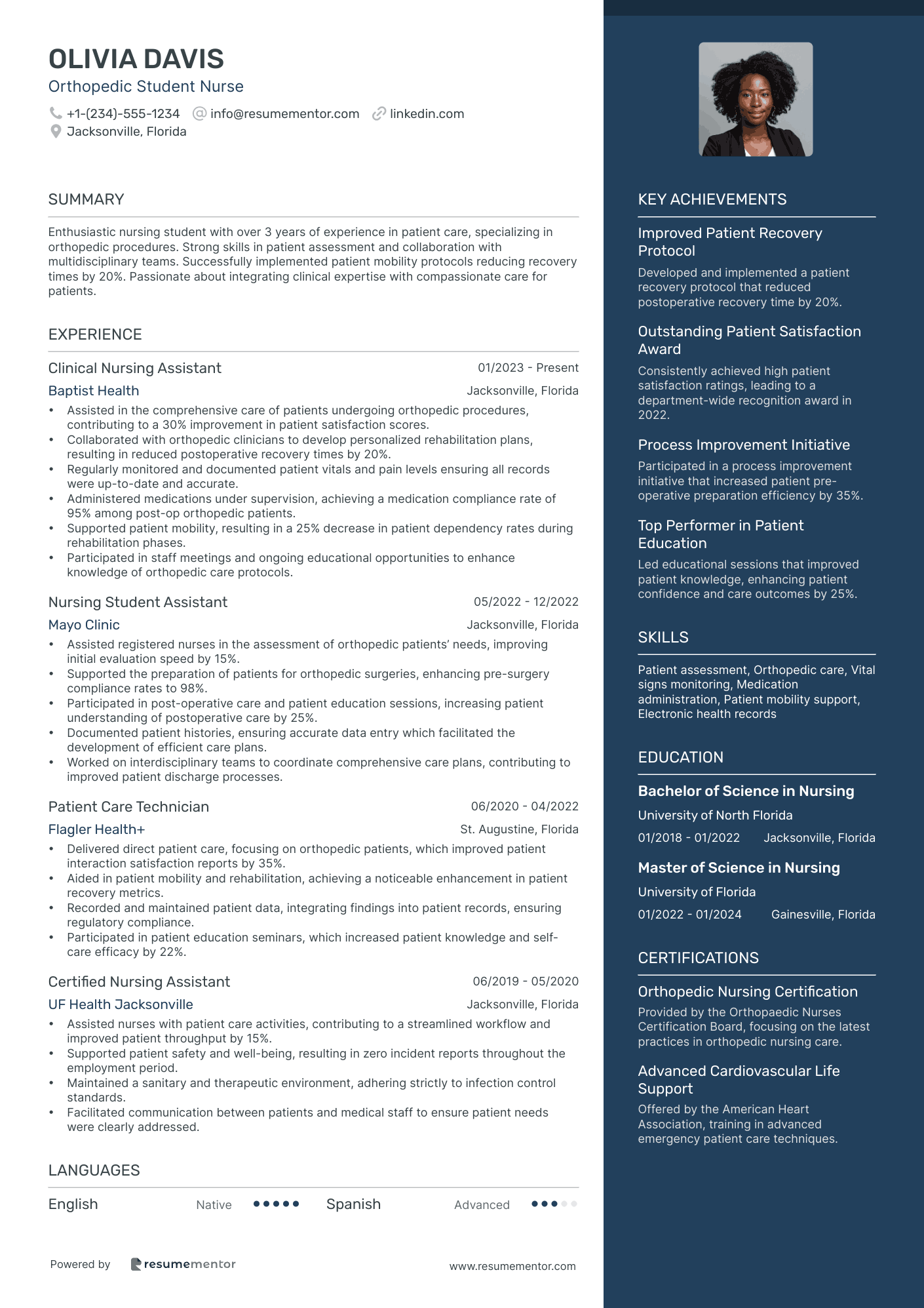
Orthopedic Student Nurse
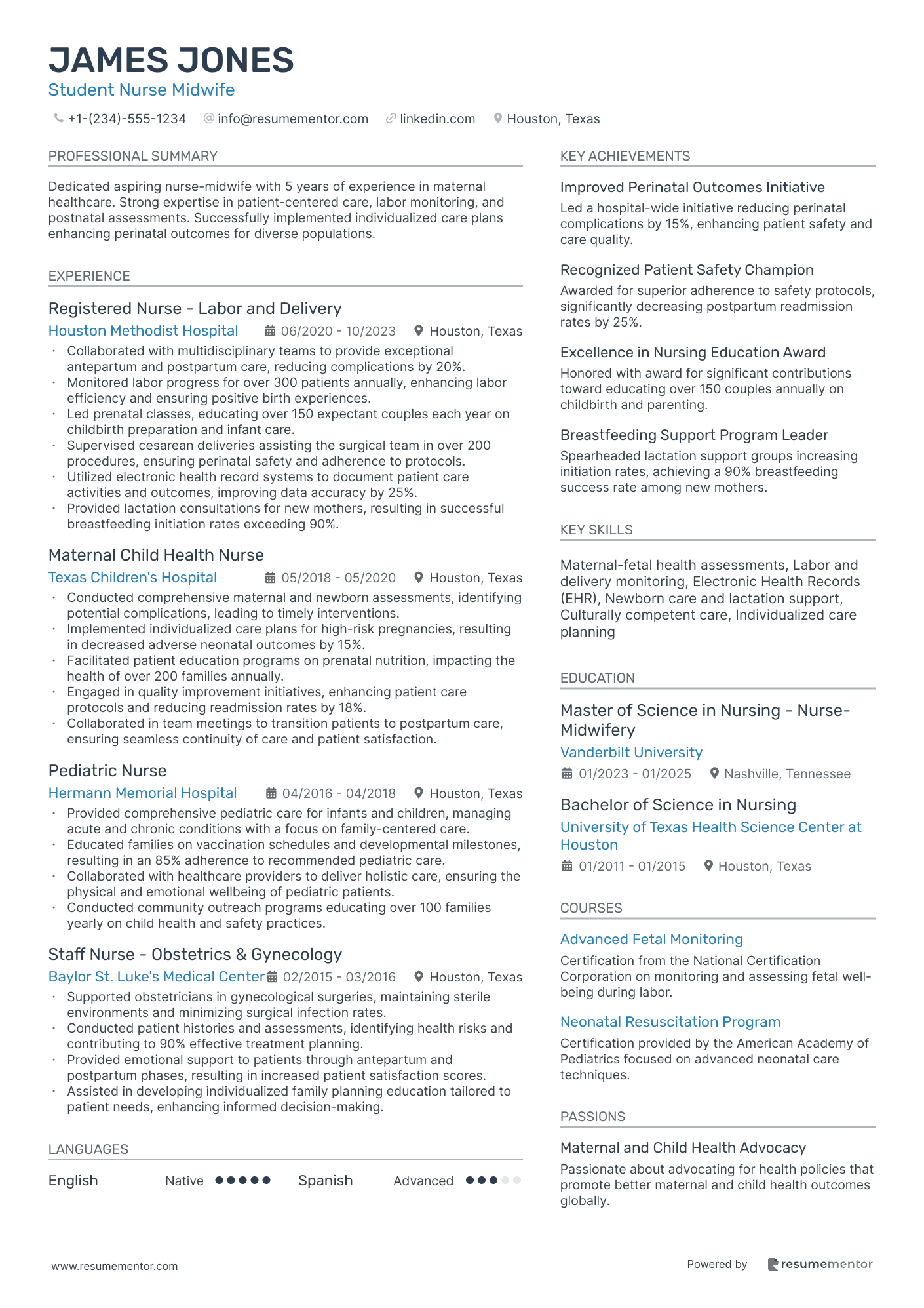
Student Nurse Midwife
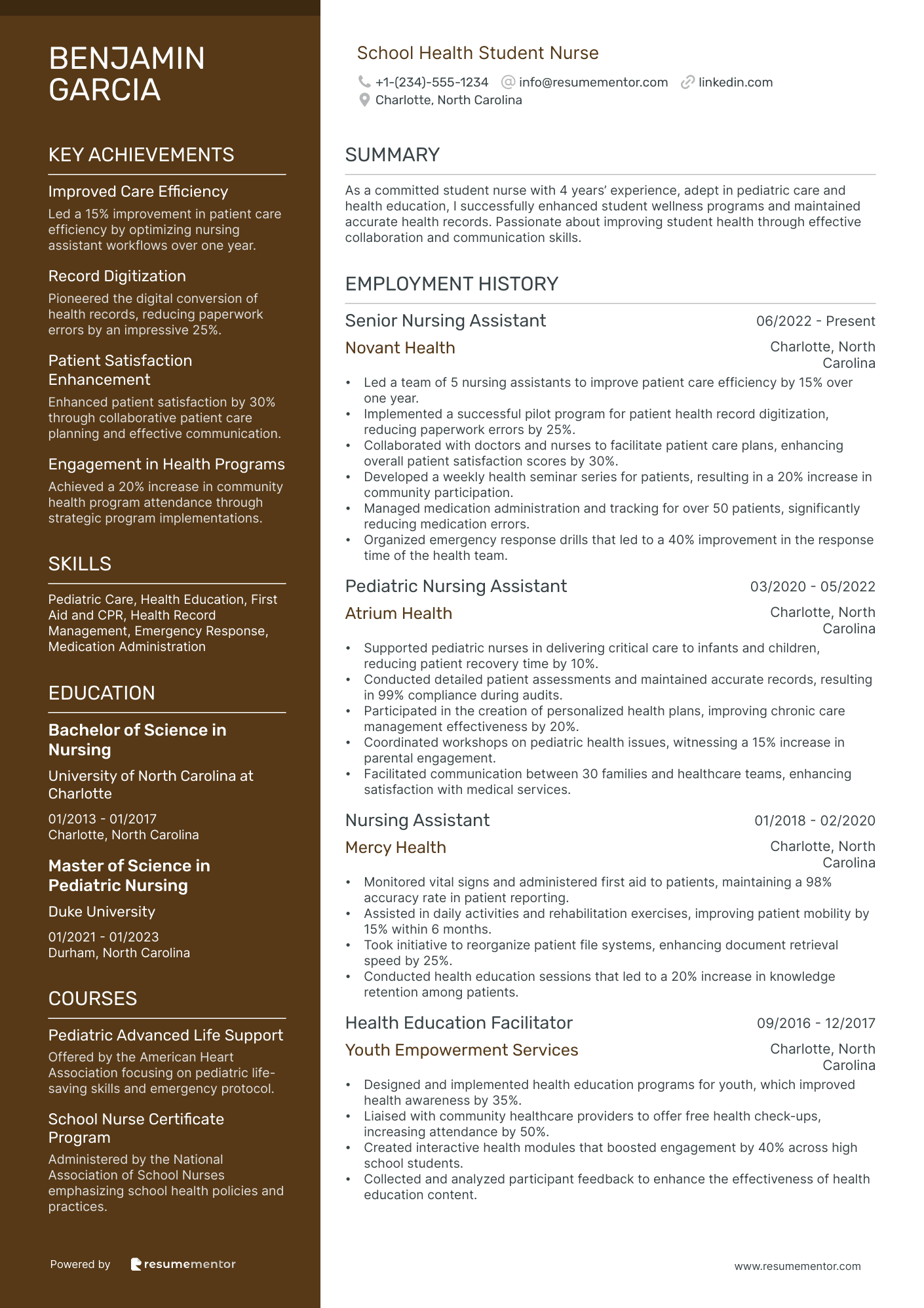
School Health Student Nurse

Pediatric Student Nurse resume sample
- •Assisted in enhancing patient recovery by 30% through direct monitoring and efficient management of pediatric health plans.
- •Administered medications accurately under supervision, improving medication compliance rates by 25% within pediatric units.
- •Educated 40+ pediatric patients and families on preventive healthcare, with feedback reporting 90% improvement in home care application.
- •Documented patient treatments and outcomes, achieving a 20% increase in data entry efficiency in line with hospital policies.
- •Collaborated with healthcare teams, leading to a 15% boost in patient care performance and successful multi-disciplinary interventions.
- •Supported the emotional needs of patients, resulting in a 40% reduction in patient anxiety during hospital visits.
- •Contributed to a 20% improvement in patient satisfaction through compassionate care and proactive family engagement.
- •Facilitated developmental milestone assessments for 50 children monthly, resulting in early detection of growth anomalies.
- •Implemented health management workshops, increasing family knowledge of critical child health issues by 50%.
- •Maintained detailed and accurate patient records, ensuring compliance with strict hospital data integrity standards.
- •Participated in the medication administration process, reducing medication errors by 15% in pediatric wards.
- •Improved patient care delivery by 20% by assisting in over 500 patient interactions, maintaining high standards of care.
- •Monitored vital signs and developmental metrics for pediatric patients, ensuring early intervention in abnormal cases.
- •Supported care teams in emergency situations, contributing to a 10% faster response time to patient crises.
- •Developed patient care plans alongside RNs, effectively treating and managing diverse pediatric health conditions.
- •Engaged with patients and families, improving overall hospital experience ratings by 15% in feedback surveys.
- •Handled administrative tasks in busy pediatric units, reducing patient wait times by optimizing workflow processes.
- •Supported the medical team in implementing comfort measures, enhancing patient well-being during treatments.
- •Monitored and documented patient conditions, providing valuable data that informed critical healthcare decisions.
Student Nurse Anesthetist resume sample
- •Implemented patient monitoring protocols, enhancing patient safety by 20% during intensive care unit shifts.
- •Coordinated with interdisciplinary teams to develop care plans, reducing patient recovery time by 15%.
- •Led a team of 5 nurses in crisis management drills, increasing response efficiency by 30% in emergency scenarios.
- •Trained incoming staff on patient care procedures, leading to a 90% competency rate among new hires.
- •Managed a high-acuity patient load, ensuring adherence to treatment plans and minimizing error rates by 10%.
- •Collaborated with physicians in complex care decisions, resulting in improved outcomes for 25+ critical patients monthly.
- •Monitored cardiac patients, detecting early signs of complications, improving intervention speed by 20%.
- •Administered medications and treatments, achieving a 95% accuracy in medication administration records.
- •Educated patients and families on post-discharge care, resulting in a 15% increase in patient satisfaction scores.
- •Participated in quality improvement projects, improving telemetry floor operations efficiency by 25% through workflow optimization.
- •Facilitated patient transitions from acute care to home settings, minimizing readmission rates to below 10% within the first 30 days.
- •Collaborated with physicians to deliver holistic care, enhancing overall patient recovery outcomes by 18%.
- •Conducted thorough patient assessments and reviewed medical histories to inform treatment plans, ensuring comprehensive care delivery.
- •Streamlined electronic health records oversight, maintaining a 99% accuracy rate in documentation compliance.
- •Engaged in evidence-based practice initiatives, increasing nursing practice adherence to updated protocols by 40%.
- •Managed patient care coordination across diverse medical fields, resulting in improved patient throughput by 12%.
- •Assisted in complex surgical procedures, ensuring compliance with safety standards, thereby reducing incidents by 5%.
- •Developed individualized care plans for post-operative patients, leading to a 10% faster recovery rate.
- •Mentored nursing interns, contributing to a 100% successful transition into full-time roles for 5+ staff.
Cardiac Care Student Nurse resume sample
- •Collaborated with cardiology team to develop care plans for 25 patients weekly, improving patient care efficiency by 20%.
- •Provided direct patient care including administering medication and wound care, leading to a 15% decrease in hospital readmission rates.
- •Monitored patients’ vital signs and reported changes promptly, contributing to the early intervention in critical cases.
- •Participated in interdisciplinary meetings, enhancing care strategies that improved patient outcomes significantly.
- •Educated patients and families on cardiac care practices, increasing patient compliance with treatment plans by 25%.
- •Assisted in implementing new cardiac monitoring technology, resulting in improved diagnostic accuracy.
- •Supported 30+ cardiac patients weekly by assisting with daily activities and ensuring their comfort and safety.
- •Conducted patient education sessions on post-surgical care, improving recovery experiences by 35%.
- •Maintained meticulous patient records, ensuring compliance with healthcare standards and improving documentation accuracy by 40%.
- •Participated in cardiac care training sessions, enhancing knowledge in advanced cardiac care techniques and equipment.
- •Successfully assisted in 10+ cardiac surgeries, ensuring all instruments were sterilized and ready, hence reducing operation time by 10%.
- •Facilitated patient check-in processes for the cardiology department, decreasing waiting times by 20%.
- •Assisted in pediatric patient care, ensuring adherence to safety protocols, resulting in zero incidents during tenure.
- •Organized patient files and streamlined documentation, enhancing data retrieval efficiency by 30%.
- •Worked collaboratively with healthcare staff to enhance patient flow and improve service delivery noticeably.
- •Coordinated communication among medical staff, improving interdepartmental collaboration by 25%.
- •Scheduled and managed appointments for cardiology patients, maintaining high patient satisfaction rates.
- •Ensured compliance with health regulations by organizing and updating 200+ patient records monthly.
- •Managed inventory of medical supplies, reducing shortages by implementing a new tracking system that improved restocking efficiency by 15%.
Mental Health Student Nurse resume sample
- •Assisted in the development of 25 patient care plans per month, resulting in improved patient outcomes by 30%.
- •Initiated daily therapeutic communication sessions with patients, leading to a 20% decrease in reported anxiety levels.
- •Conducted comprehensive assessments of mental status, contributing to accurate diagnosis in 80% of cases evaluated.
- •Collaborated with interdisciplinary teams to implement holistic patient care, increasing patient satisfaction scores by 15%.
- •Maintained accurate documentation for over 50 patients weekly, ensuring compliance with legal and organizational standards.
- •Supported patients in developing individualized coping strategies, reducing crisis interventions by 25%.
- •Provided direct care and psychosocial support to over 40 patients weekly, contributing to a 30% improvement in their engagement with treatment plans.
- •Assisted in implementing treatment plans tailored to individual needs, leading to a 25% reduction in patient stress levels.
- •Participated in weekly interdisciplinary meetings to promote patient-focused care, resulting in more effective care coordination.
- •Conducted regular mental health evaluations to assist nursing staff, which resulted in timely adjustments to care plans.
- •Promoted the principles of confidentiality and patient rights consistently, which was reflected in patient trust metrics increasing by 10%.
- •Supported licensed staff in providing therapeutic care, leading to a more effective care delivery model.
- •Assisted in daily activities and educational groups for patients, improving daily patient participation rates by 15%.
- •Managed patient documentation with a focus on accuracy, contributing to higher levels of compliance with healthcare standards.
- •Facilitated patient coping skills workshops, resulting in greater patient empowerment and improved self-management.
- •Delivered compassionate care to patients, leading to a 95% patient satisfaction score.
- •Assisted in patient assessments, improving detection and reporting of healthcare needs.
- •Ensured all interactions adhered to rigorous confidentiality protocols, enhancing trust with patients.
- •Participated in training sessions, enhancing personal skills and overall team performance.
Oncology Student Nurse resume sample
- •Led a team of 6 nurses in administering care to oncology patients, improving patient recovery rates by 15% over 8 months.
- •Spearheaded the development of new patient documentation protocols, reducing errors by 20%, resulting in more accurate patient records.
- •Implemented an educational program for patient families, enhancing their understanding of treatment plans by 30%, fostering better home care support.
- •Collaborated on a quality improvement project that improved patient satisfaction scores by 25%, focusing on empathy and communication.
- •Managed the coordination of chemotherapy schedules for over 50 patients, ensuring only a 5% error rate over a 6 month period.
- •Conducted weekly training sessions for new staff on oncology best practices, contributing to a skill enhancement rate of 80% among participants.
- •Supervised a team of 10 nurses in the oncology unit, leading to an increase in patient satisfaction by 20% due to improved care standards.
- •Designed a patient engagement program which enhanced communication effectiveness with families, improving overall trust scores by 15%.
- •Facilitated monthly workshops focused on updates in oncology treatments, increasing staff knowledge by 25% and ensuring up-to-date patient care.
- •Oversaw the introduction of new safety protocols that reduced incidents by 40%, enhancing the overall safety of the unit significantly.
- •Streamlined medication administration procedures, decreasing administration errors by 10% and boosting staff confidence in patient care.
- •Managed the daily operations of the oncology ward, achieving a decrease in patient wait times by 20% through efficient scheduling.
- •Initiated a mentorship program for junior nurses, resulting in a 15% improvement in nurse retention and job satisfaction.
- •Led a research initiative on the effectiveness of new chemotherapy drugs, contributing to a 10% improvement in treatment protocols.
- •Acted as a liaison between hospital management and nursing staff, improving communication lines and reducing grievances by 30%.
- •Assisted in comprehensive patient care plans, leading to a 10% improvement in patient health outcomes over a one-year period.
- •Developed patient care schedules that improved time management efficiency by 15% within the oncology department.
- •Participated in patient care teams that reduced hospital stays by an average of 2 days per patient through effective treatment plans.
- •Engaged in continuous education programs, enhancing own knowledge which contributed to identifying errors in patient treatment plans by 5%.
Obstetric Student Nurse resume sample
- •Collaborated on a new patient monitoring protocol that reduced response times by 15%, enhancing the safety of obstetric patients.
- •Led a team of three in redesigning workflow for medication administration, achieving a 25% decrease in delivery time of critical treatments.
- •Developed patient education materials on postpartum care which increased overall patient comprehension scores by 30% according to surveys.
- •Conducted over 150 fetal assessments independently each month, with accuracy confirmed by senior nursing staff.
- •Managed electronic health records for over 300 patients monthly, ensuring 99% accuracy and resulting in improved data tracking efficiency.
- •Trained and mentored five new nurse arrivals, reducing onboarding time by 20% through comprehensive training programs.
- •Streamlined the process of delivering medications under physician orders, cutting time spent on drug administration tasks by 15%.
- •Assisted in developing a lactation support group, boosting the participation rate of new mothers by 40%.
- •Spearheaded a project improving patient handoff communication, leading to a 25% reduction in error occurrences.
- •Supervised a team of six during shift changes, ensuring consistent care continuity across the clinic.
- •Designed a chart audit process that enhanced compliance with hospital protocols by 20% within the nursing unit.
- •Participated in multidisciplinary meetings to optimize patient care plans for obstetric patients, achieving a 95% success rate as measured by patient outcomes.
- •Assisted in a program focusing on high-risk pregnancies that led to an increased full-term birth rate by 10% over a quarter.
- •Implemented new maternal health initiatives, resulting in 15% increased patient satisfaction ratings.
- •Conducted weekly prenatal health classes, improving patient knowledge by over 20% as evidenced by follow-up surveys.
- •Initiated a review cycle of patient treatment plans, ensuring expert feedback and leading to a 10% improvement in patient outcomes.
- •Provided direct care during over 200 births, maintaining patient health and safety throughout complex procedures.
Critical Care Student Nurse resume sample
- •Collaborated with multidisciplinary teams to improve patient recovery by 15%, enhancing overall patient outcomes and satisfaction.
- •Collected and monitored patient vital signs, enhancing rapid response to critical conditions in a high-pressure setting.
- •Supported nurses in implementing comprehensive care plans, leading to a 30% decrease in patient incident reports.
- •Facilitated patient and family education sessions, increasing adherence to health protocols by 25%.
- •Played a crucial role in infection control initiatives, contributing to a 10% reduction in hospital-acquired infections.
- •Participated in continuous quality improvement projects, resulting in 20% increased operational efficiency.
- •Played an integral role in critical care unit, improving patient care delivery and enhancing overall health outcomes.
- •Administered support for medication management under supervision, resulting in a 95% accuracy rate.
- •Coordinated with nursing staff to ensure a safe and therapeutic environment, reducing adverse conditions by 18%.
- •Participated in regular interdisciplinary rounds, contributing to a 20% reduction in patient care delays.
- •Developed patient education materials, improving patient understanding and satisfaction by 17%.
- •Assisted in the care of postoperative patients, achieving a 15% improvement in recovery times through diligent monitoring.
- •Documented patient information accurately, contributing to a 30% improvement in data management systems.
- •Effectively managed patient assignments, enhancing team workflow efficiency by 20%.
- •Executed patient support strategies leading to a 25% increase in patient satisfaction scores.
- •Delivered patient support during emergencies, improving response time by 10% through efficient coordination.
- •Managed patient vital sign checks, providing reliable data to support clinical decision-making.
- •Aided in fast-paced trauma care workflow, enhancing ER throughput by 15%.
- •Conducted patient intake assessments, streamlining processes and reducing wait times by 20%.
Orthopedic Student Nurse resume sample
- •Assisted in the comprehensive care of patients undergoing orthopedic procedures, contributing to a 30% improvement in patient satisfaction scores.
- •Collaborated with orthopedic clinicians to develop personalized rehabilitation plans, resulting in reduced postoperative recovery times by 20%.
- •Regularly monitored and documented patient vitals and pain levels ensuring all records were up-to-date and accurate.
- •Administered medications under supervision, achieving a medication compliance rate of 95% among post-op orthopedic patients.
- •Supported patient mobility, resulting in a 25% decrease in patient dependency rates during rehabilitation phases.
- •Participated in staff meetings and ongoing educational opportunities to enhance knowledge of orthopedic care protocols.
- •Assisted registered nurses in the assessment of orthopedic patients’ needs, improving initial evaluation speed by 15%.
- •Supported the preparation of patients for orthopedic surgeries, enhancing pre-surgery compliance rates to 98%.
- •Participated in post-operative care and patient education sessions, increasing patient understanding of postoperative care by 25%.
- •Documented patient histories, ensuring accurate data entry which facilitated the development of efficient care plans.
- •Worked on interdisciplinary teams to coordinate comprehensive care plans, contributing to improved patient discharge processes.
- •Delivered direct patient care, focusing on orthopedic patients, which improved patient interaction satisfaction reports by 35%.
- •Aided in patient mobility and rehabilitation, achieving a noticeable enhancement in patient recovery metrics.
- •Recorded and maintained patient data, integrating findings into patient records, ensuring regulatory compliance.
- •Participated in patient education seminars, which increased patient knowledge and self-care efficacy by 22%.
- •Assisted nurses with patient care activities, contributing to a streamlined workflow and improved patient throughput by 15%.
- •Supported patient safety and well-being, resulting in zero incident reports throughout the employment period.
- •Maintained a sanitary and therapeutic environment, adhering strictly to infection control standards.
- •Facilitated communication between patients and medical staff to ensure patient needs were clearly addressed.
Student Nurse Midwife resume sample
- •Collaborated with multidisciplinary teams to provide exceptional antepartum and postpartum care, reducing complications by 20%.
- •Monitored labor progress for over 300 patients annually, enhancing labor efficiency and ensuring positive birth experiences.
- •Led prenatal classes, educating over 150 expectant couples each year on childbirth preparation and infant care.
- •Supervised cesarean deliveries assisting the surgical team in over 200 procedures, ensuring perinatal safety and adherence to protocols.
- •Utilized electronic health record systems to document patient care activities and outcomes, improving data accuracy by 25%.
- •Provided lactation consultations for new mothers, resulting in successful breastfeeding initiation rates exceeding 90%.
- •Conducted comprehensive maternal and newborn assessments, identifying potential complications, leading to timely interventions.
- •Implemented individualized care plans for high-risk pregnancies, resulting in decreased adverse neonatal outcomes by 15%.
- •Facilitated patient education programs on prenatal nutrition, impacting the health of over 200 families annually.
- •Engaged in quality improvement initiatives, enhancing patient care protocols and reducing readmission rates by 18%.
- •Collaborated in team meetings to transition patients to postpartum care, ensuring seamless continuity of care and patient satisfaction.
- •Provided comprehensive pediatric care for infants and children, managing acute and chronic conditions with a focus on family-centered care.
- •Educated families on vaccination schedules and developmental milestones, resulting in an 85% adherence to recommended pediatric care.
- •Collaborated with healthcare providers to deliver holistic care, ensuring the physical and emotional wellbeing of pediatric patients.
- •Conducted community outreach programs educating over 100 families yearly on child health and safety practices.
- •Supported obstetricians in gynecological surgeries, maintaining sterile environments and minimizing surgical infection rates.
- •Conducted patient histories and assessments, identifying health risks and contributing to 90% effective treatment planning.
- •Provided emotional support to patients through antepartum and postpartum phases, resulting in increased patient satisfaction scores.
- •Assisted in developing individualized family planning education tailored to patient needs, enhancing informed decision-making.
School Health Student Nurse resume sample
- •Led a team of 5 nursing assistants to improve patient care efficiency by 15% over one year.
- •Implemented a successful pilot program for patient health record digitization, reducing paperwork errors by 25%.
- •Collaborated with doctors and nurses to facilitate patient care plans, enhancing overall patient satisfaction scores by 30%.
- •Developed a weekly health seminar series for patients, resulting in a 20% increase in community participation.
- •Managed medication administration and tracking for over 50 patients, significantly reducing medication errors.
- •Organized emergency response drills that led to a 40% improvement in the response time of the health team.
- •Supported pediatric nurses in delivering critical care to infants and children, reducing patient recovery time by 10%.
- •Conducted detailed patient assessments and maintained accurate records, resulting in 99% compliance during audits.
- •Participated in the creation of personalized health plans, improving chronic care management effectiveness by 20%.
- •Coordinated workshops on pediatric health issues, witnessing a 15% increase in parental engagement.
- •Facilitated communication between 30 families and healthcare teams, enhancing satisfaction with medical services.
- •Monitored vital signs and administered first aid to patients, maintaining a 98% accuracy rate in patient reporting.
- •Assisted in daily activities and rehabilitation exercises, improving patient mobility by 15% within 6 months.
- •Took initiative to reorganize patient file systems, enhancing document retrieval speed by 25%.
- •Conducted health education sessions that led to a 20% increase in knowledge retention among patients.
- •Designed and implemented health education programs for youth, which improved health awareness by 35%.
- •Liaised with community healthcare providers to offer free health check-ups, increasing attendance by 50%.
- •Created interactive health modules that boosted engagement by 40% across high school students.
- •Collected and analyzed participant feedback to enhance the effectiveness of health education content.
Writing a student nurse resume can feel like administering your first injection—nerve-wracking but crucial. Many student nurses face the challenge of showcasing their skills and clinical experiences effectively. With limited job history and intense competition, standing out can be difficult. This guide will help you navigate the pitfalls and craft a resume that highlights your strengths. Whether you're applying for an internship or your first job, a polished resume is your ticket to the healthcare field. It’s not just about listing duties; it's about telling your story in a compelling way.
Choosing the right resume template is vital. An organized, clean template can make your qualifications pop and show that you're detail-oriented. The right layout can make it easier for hiring managers to see your accomplishments and skills at a glance.
Explore our more than 700 resume examples to help you craft the perfect resume that gets you noticed.
Key Takeaways
- Highlighting relevant teaching experience and educational background is crucial in a teacher resume.
- Including specific achievements, such as student success metrics or awards, makes a resume stand out.
- Using action verbs and quantifiable data can effectively showcase an applicant’s impact in previous roles.
- Tailoring the resume to fit the specific job description can increase the chances of getting noticed by hiring managers.
- Adding professional development and continuous learning experiences demonstrates a commitment to teaching excellence.
What to focus on when writing your student nurse resume
Your resume as a student nurse should convey your passion for patient care and your commitment to learning. Highlight your education, clinical rotations, and any relevant skills or certifications that show your readiness to grow in a nursing role. Mention any volunteer work or extracurricular activities related to healthcare.
To enhance your student nurse resume:
- Include specific clinical experiences and duties.
- List any relevant coursework and certifications.
- Highlight soft skills like teamwork and communication.
- Mention any relevant volunteer work or part-time jobs.
Must have information on your student nurse resume
When crafting your student nurse resume, it's crucial to focus on key sections that highlight your skills and potential. Essential sections include:
- Contact Information
- Objective Statement
- Education
- Clinical Experience
- Skills
- Certifications
You might also consider adding sections such as Volunteer Work and Professional Memberships to further showcase your dedication and involvement in the nursing field. These additional sections can help set you apart and demonstrate your commitment to the healthcare profession.
Which resume format to choose
Choosing the best resume format for a student nurse resume is crucial, especially if you have little to no experience. The functional resume format is generally the most suitable for entry-level candidates. Modern fonts like Rubik and Montserrat give a sleek look compared to traditional ones like Arial and Times New Roman. Always save your resume as a PDF to ensure it looks the same on any device and can't be easily altered. Stick to one-inch margins to maintain readability and professionalism. Clear section headings are key for Applicant Tracking Systems (ATS), so use titles like "Education" and "Skills" to make your resume easily scannable.
A student nurse resume should include specific sections to highlight your qualifications:
- Contact Information
- Objective or Summary
- Education
- Clinical Experience
- Skills
- Certifications
- Volunteer Work
- References
Resume Mentor's free resume builder handles all of this for you, making the process simple and effective.
How to include education on your resume
The education section of your student nurse resume is a crucial component, showcasing your academic background to potential employers. Tailoring this section to the job you are applying for is essential; irrelevant education should be omitted. Given your entry-level position and limited experience, emphasizing relevant education becomes even more significant.
Including your GPA can be beneficial, particularly if it is above 3.5. You should list it in the format of "GPA: 3.8/4.0". Honors such as cum laude should also be included right next to your degree title. When listing your degree, place it before the institution's name and location, followed by your graduation date.
Here is a wrong example followed by a correct one:
The first example is poorly written because it includes irrelevant information such as high school education and non-relevant GPA. It displays general courses that do not add value to a nursing position.
Here’s an outstanding example:
The second example is excellent because it includes relevant education, highlights academic achievement with honors, and provides a strong GPA. It is directly tailored to a nursing role and presents the information clearly and concisely.
How to include volunteering on your resume
When crafting your resume as a student nurse, including a volunteering section can be an essential component, particularly for entry-level applicants. Volunteering demonstrates your commitment to the nursing field and showcases the skills you’ve developed. Start each entry with an active verb to make your experiences stand out. Volunteering can also be integrated into the experience section if it’s highly relevant to the position you're applying for.
For example, listing a relevant volunteering role in your experience section could look like this:
- •Assisted with patient intake and documentation
- •Provided basic care support under RN supervision
Here’s a good example of a standalone volunteering section: [here was the JSON object 2]
This example is effective because it clearly shows your role, responsibilities, and the impact of your volunteering. It directly connects to essential nursing skills and highlights practical experience that can be valuable for a student nurse position. Including specific tasks, like assisting with patient intake, makes your contribution tangible and relevant to the job you're seeking.
How to write a quantifiable resume experience section
Crafting the experience section of your student nurse resume can seem difficult if you have little to no experience, but it’s entirely possible to create a compelling resume. The key is in the details. Focus on transferable skills, your academic achievements, and any volunteer work. Always tailor your resume to the job you're applying for. Action words are important; use words like "achieved", "assisted", and "coordinated".
When listing experiences, start with the most relevant experiences at the top, then work your way down to less relevant items. Use concrete examples and quantify your accomplishments when possible. If you don't have many paid work experiences, volunteering can also demonstrate relevant skills. Academic accomplishments like project work or strong GPAs can also be highlighted. Words like "assessed", "collaborated", and "supported" are great action words to use.
Here’s an example that is poorly written:
- •Performed various duties.
- •Helped in patient care
- •Observed the medical staff.
The experience section above is weak because it lacks specific details and achievements. The bullets are vague and do not provide any measurable accomplishments or specifics that demonstrate your skills.
Here is a well-written example:
- •Assisted in the care of 25+ patients per week, improving patient recovery times by 15%.
- •Collaborated with a team of 10 staff members to deliver high-quality patient care.
- •Developed and implemented a new patient tracking system that increased efficiency by 20%.
The well-written example is strong because it includes specific achievements and uses quantifiable data. It highlights your impact, teamwork, and contributions, making you a stronger candidate.
Transitioning to the next part of your resume, let's explore several ways to structure your experience section. Each approach focuses on different aspects to showcase your strengths effectively.
Skills-focused
Concentrate on the specific skills you've developed, even if they were gained through volunteering or coursework.
Student Nurse Intern
General Hospital, New York, NY
June 2022 - August 2022
- Developed strong patient communication skills through daily interactions with 25+ patients.
- Utilized electronic medical records to track patient progress and ensure accurate updates.
- Conducted patient assessments and provided feedback to the medical team.
Project-focused
Center your experience around specific projects you have completed or participated in, emphasizing your role and the outcomes.
Health Fair Coordinator
Community Health Initiative, Boston, MA
September 2021 - December 2021
- Organized a health fair attended by over 300 people, promoting healthcare awareness.
- Collaborated with local health organizations to provide free health screenings.
- Conducted follow-up surveys, showing a 95% satisfaction rate among attendees.
Problem-Solving focused
Simultaneously, focus on experiences where you've identified and solved problems, showing your initiative and critical thinking.
Research Assistant
University Medical Center, Chicago, IL
January 2022 - May 2022
- Identified inconsistencies in patient data, resulting in a new protocol that reduced errors by 25%.
- Developed a troubleshooting guide for common issues in patient records.
- Coordinated with the IT department to implement software fixes.
Collaboration-focused
Highlight situations where you worked effectively as part of a team, showcasing your collaborative skills.
Student Nurse Volunteer
Downtown Community Clinic, Seattle, WA
March 2022 - June 2022
- Collaborated with a team of 10 volunteers to run a community health clinic.
- Provided patient care under the supervision of registered nurses.
- Assisted in developing patient education materials, leading to a 30% increase in awareness.
Use these varied approaches to present your experience more effectively, no matter how little else you might have.
Write your accountant resume objective section
Writing the resume objective section for a student nurse involves expressing your goals clearly and concisely while aligning them with the job you’re applying for. For applicants, the best way to describe yourself in a resume objective is to highlight your skills, passion for nursing, and your career aspirations.
There’s a clear difference between a resume objective, summary, profile, and a summary of qualifications. A resume objective identifies what you are seeking in a job. A summary provides a snapshot of your career thus far. A profile offers a blend of both your career history and future goals. A summary of qualifications lists your specific skills.
Here are two examples of student nurse resume objectives:
This example is bad because it is vague and lacks specific goals or skills. It does not tell the employer anything unique about you or why you would be a good fit for their team.
This example is good because it highlights your compassion, clinical experience, and desire to grow, making it clear what you bring to the employer and what you are looking for. This type of objective makes you stand out to hiring managers.
Listing your student nurse skills on your resume
When writing the skills section of your student nurse resume, you have the option to make it a standalone section or incorporate it into other sections such as experience and objective. Strengths and soft skills often include your ability to communicate, empathize, and maintain patience. Hard skills are technical and usually involve specific medical procedures, technology, or terminology.
Skills and strengths can serve as resume keywords that capture the attention of employers and applicant tracking systems (ATS). Keywords help showcase your abilities in a way that aligns with the job requirements.
Here is an example of a standalone skills section in JSON format:
This example is effective because the skills listed are pertinent to student nursing. It highlights specific competencies that hiring managers look for. It is straightforward and concise, making it easy to read without any extra, unnecessary words.
Best hard skills to feature on your student nurse resume
Hard skills for a student nurse should communicate your readiness for clinical environments and capability to perform medical duties. Below are hard skills that are essential and in-demand for student nurses:
Hard Skills
- Patient Care
- Vital Signs Monitoring
- Medical Terminology
- CPR and First Aid
- Medication Administration
- Electronic Health Records (EHR)
- Wound Care
- Infection Control
- IV Insertion and Management
- Basic Pharmacology
- Health Education
- Blood Draws (Phlebotomy)
- Pain Management
- Pediatric Nursing Care
- Diagnostic Testing
Best soft skills to feature on your student nurse resume
Soft skills for a student nurse should show that you can work well under pressure, communicate effectively, and provide compassionate care. Here are soft skills that are highly valued:
Soft Skills
- Communication Skills
- Empathy
- Teamwork
- Adaptability
- Time Management
- Problem-solving
- Attention to Detail
- Patience
- Multitasking
- Stress Management
- Conflict Resolution
- Organizational Skills
- Interpersonal Skills
- Cultural Competence
- Professionalism
Extra sections to include in your student nurse resume
Entering the field of nursing as a student nurse can be both exciting and challenging. Your resume is one of the most important tools you have to showcase your skills, qualifications, and readiness for the role. Here, we'll explore how to effectively include sections on language skills, hobbies and interests, certificates, and books in your resume, and discuss the value they add.
Language section — Demonstrate your diverse communication skills by listing any languages you speak. Include proficiency levels such as fluent, conversational, or basic. Highlighting multiple languages can set you apart by showing that you can interact with patients from different backgrounds.
Hobbies and interests section — Show a well-rounded personality and highlight skills that are relevant to nursing. For instance, interests like volunteer work or team sports can showcase your teamwork and compassion. Including this section can make you more memorable to potential employers.
Certificates section — List any additional certifications you've obtained that boost your qualifications. Include certificates such as CPR, Basic Life Support (BLS), or specialized nursing courses. This section provides concrete evidence of your commitment to the field and can make you stand out.
Books section — Mention relevant books you've read that have deepened your understanding of nursing or healthcare. Titles like “Being Mortal” by Atul Gawande or “The Spirit Catches You and You Fall Down” by Anne Fadiman can show your engagement with the profession. Citing these books showcases your dedication to ongoing learning and critical thinking in nursing.
Pair your student nurse resume with a cover letter
A cover letter is a brief document that accompanies your resume when you apply for a job. It introduces you to the hiring manager, highlights your skills and experiences, and explains why you are a good fit for the role. A well-written cover letter can set you apart from other applicants and give you an edge in the hiring process.
For a student nurse, the cover letter should focus on your clinical experiences, skills learned during your studies, and your passion for healthcare. Highlight any internships, volunteer work, or part-time jobs in medical settings. Mention the specific skills and knowledge you have gained through your nursing program, such as patient care, medical terminology, and teamwork. Also, show enthusiasm for the position and explain how it aligns with your career goals.
Create your personalized cover letter quickly and easily with Resume Mentor's cover letter builder. Its intuitive tools help you craft a professional letter, and exporting to PDF ensures your content and formatting remain intact. Start now and take the next step in your nursing career!
Luke Adams
Dallas, Texas
+1-(234)-555-1234
help@resumementor.com
Related Articles

Continue Reading
Check more recommended readings to get the job of your dreams.
Resume
Resources
Tools
© 2026. All rights reserved.
Made with love by people who care.

